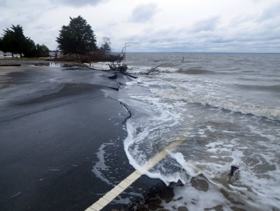New SPP Publication: Meeting User Requirements For Sea Level Rise Information
Although information about future sea level rise is essential for coastal communities to make informed decisions about how to adapt to climate change, few studies have analyzed the types of data users need to accomplish this. Despite recent attempts to equip decision makers with the practical, scientifically based data they need to help communities effectively adapt to climate change, few studies have examined the specific types of climate services these users require. This deficiency includes information about mean sea level rise, a crucial basis for informed decisions about local coastal adaptations.
To address this gap Hinkel et al. utilize decision analysis to systematically identify which sea level rise data users most need and then determine whether these requirements can be met given current scientific knowledge. The results indicate that the kinds of information that would be most helpful to decision makers depend upon both the context and the level of uncertainty each user can tolerate.
The team’s analysis identified several types of desired sea level rise information that are currently scientifically attainable. These include high- and low-end sea level rise scenarios created for a range of uncertainty tolerance levels as well as probabilistic predictions, which can support short-term decisions (prior to 2050) in locations where the reasons behind climate variability are relatively well understood. The team also determined that learning scenarios, which estimate what new information about sea level rise will become available in the future, could improve longer-term decisions.
By focusing on the needs of decision makers as well as sea level rise data that are scientifically attainable, this study offers a noteworthy example of how to bridge the divide between the scientists who produce climate information and the decision makers who use it. Because this approach can also be applied to other types of climate change mitigation and adaptation information, it offers a practical roadmap for co-designing the climate services upon which the health and safety of communities around the world will increasingly depend. (Earth’s Future, https://agupubs.onlinelibrary.wiley.com/doi/10.1029/2018EF001071, 2019)

